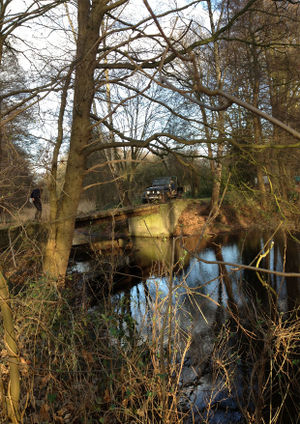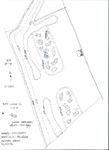Collaborative Design Planting Design Working Group 4: Difference between revisions
Imlamehuys (talk | contribs) No edit summary |
|||
| Line 40: | Line 40: | ||
Due to the fact the plot has been managed at a low maintenance ratio, a lot of the garden has succumb to overgrowth and weeds. As the park is not only botanically interesting, but also the way it has been laid out, we see the restoration of the landscape park as the main objective. The first step woud be to do a survey of what was orignally planned and planted and to compare that with what trees and shrubs are still there and growing. A further step towards the restoration, would be to put together a maintenance plan, that would include things like pruning of the trees and shrubs, the removal of invasive and unwanted species and defining grassland maintenance from woodland and wetland maintenance. | Due to the fact the plot has been managed at a low maintenance ratio, a lot of the garden has succumb to overgrowth and weeds. As the park is not only botanically interesting, but also the way it has been laid out, we see the restoration of the landscape park as the main objective. The first step woud be to do a survey of what was orignally planned and planted and to compare that with what trees and shrubs are still there and growing. A further step towards the restoration, would be to put together a maintenance plan, that would include things like pruning of the trees and shrubs, the removal of invasive and unwanted species and defining grassland maintenance from woodland and wetland maintenance. | ||
Since the park is so vastand we have so little time, we have decided on choosing a smaller representative patch within the perimeter. This patch of land has a high density of the various different structural elements, that can be found within the Hemelrijk landscape park. The ideas and principles that we develop for the Spillebeek patch can then be applied to the rest of the park. | Since the park is so vastand we have so little time, we have decided on choosing a smaller representative patch within the perimeter. This patch of land has a high density of the various different structural elements, that can be found within the Hemelrijk landscape park. The ideas and principles that we develop for the Spillebeek patch, can then be applied to the rest of the park. | ||
== Analytical drawings == | == Analytical drawings == | ||
Revision as of 13:50, 8 January 2014
---> back to group page working group 4
Please add the title of your case study here, adjust the map coordinates and replace the moa image with a characteristic image of your site
| Name | Arboretum Hemelrijk - Area Spillebeek | |
| Location | Essen | |
| Country | Belgium | |
| Authors | Anna Martinez, Oliver Linder, Matthieu Mehuys | |

| ||
|
| ||
Landscape and/or urban context of your case
- Biogeography, cultural features, overall character, history and dynamics
- you can keep this short
- Illustration: Map; sketches; short descriptive analyses
What are the objectives of your design?
Due to the fact the plot has been managed at a low maintenance ratio, a lot of the garden has succumb to overgrowth and weeds. As the park is not only botanically interesting, but also the way it has been laid out, we see the restoration of the landscape park as the main objective. The first step woud be to do a survey of what was orignally planned and planted and to compare that with what trees and shrubs are still there and growing. A further step towards the restoration, would be to put together a maintenance plan, that would include things like pruning of the trees and shrubs, the removal of invasive and unwanted species and defining grassland maintenance from woodland and wetland maintenance. Since the park is so vastand we have so little time, we have decided on choosing a smaller representative patch within the perimeter. This patch of land has a high density of the various different structural elements, that can be found within the Hemelrijk landscape park. The ideas and principles that we develop for the Spillebeek patch, can then be applied to the rest of the park.
Analytical drawings
Please add four analytical sketches/drawings (or montages/schemes) of your case. Every group member needs to contribute at least one drawing.
- Analytical Drawings
- Yourfilename2.jpg
analytical drawing 2
- Yourfilename3.jpg
analytical drawing 3
- Yourfilename4.jpg
analytical drawing 4
Projective drawings
Please add four projective sketches/drawings (or montages/schemes), of course with an emphasis on planting design/vegetation aspects. Every group member needs to contribute at least one drawing representing his/her individual ideas.
- Projective Drawings
- Yourfilename1.jpg
projective drawing 1
- Yourfilename2.jpg
projective drawing 2
- Yourfilename3.jpg
projective drawing 3
- Yourfilename4.jpg
projective drawing 4
Design Synthesis
Please analyse the individual approaches presented so far and evaluate their strengths and weaknesses (you may use the SWOTanalysis model). Try to create a synthesis and represent it with a plan and some sketches. You can still use drawings/sketches.
- Design Synthesis Drawings
- Yourfilename1.jpg
synthesis drawing 1
- Yourfilename2.jpg
synthesis drawing 2
- Yourfilename3.jpg
synthesis drawing 3
- Yourfilename4.jpg
synthesis drawing 4
Summary of the collaborative process
Please reflect on your collaborative design process. Which potentials have you encountered? What was most difficult? What does collaborative design mean for you? (approx 150 words).
Image Gallery
You may add a series of images/photos in addition to the sketches/drawings
- Image Gallery
- Yourfilename1.jpg
image 1
- Yourfilename2.jpg
image 2
- Yourfilename3.jpg
image 3
- Yourfilename4.jpg
image 4
References
* Please make sure that you give proper references of all external resources used.
* Do not use images of which you do not hold the copyright.
* Please add internet links to other resources if necessary.
About categories: You can add more categories with this tag: "", add your categories
